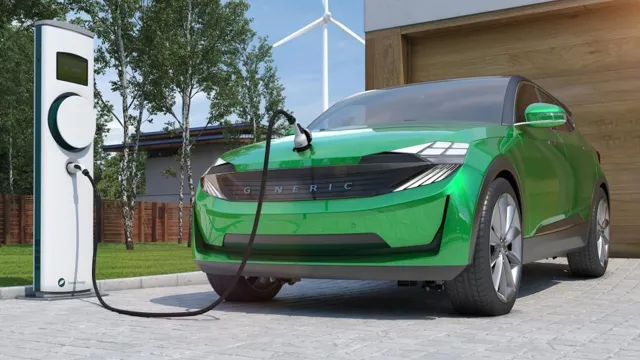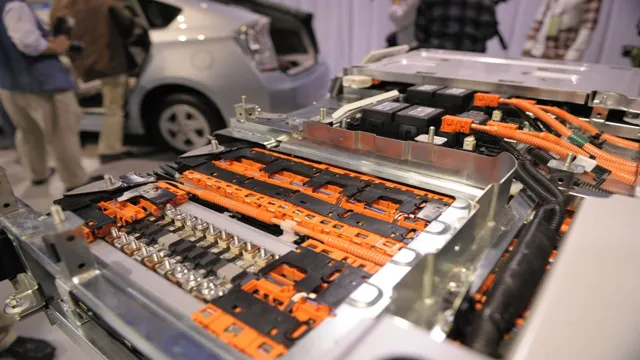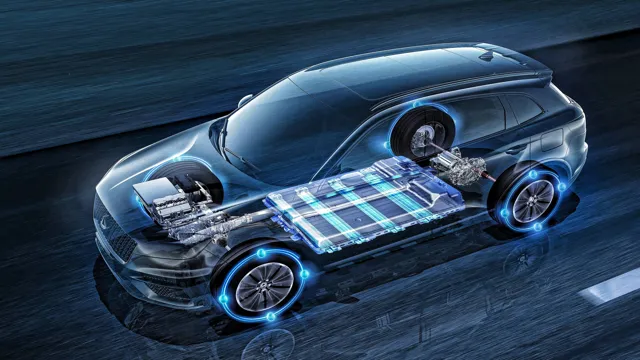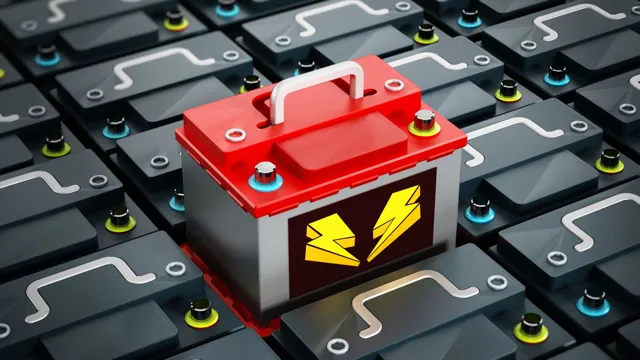Breaking Down the Battery: Do Electric Cars Only Run on Lithium-ion Technology?
Electric cars are becoming increasingly popular, with more and more drivers making the switch to this sustainable mode of transportation. However, there are still some myths and misconceptions surrounding electric cars, particularly when it comes to their lithium batteries. Some people believe that these batteries are harmful to the environment, or that they degrade quickly, but are these claims really valid? In this blog, we’ll examine the facts and myths surrounding electric cars and lithium batteries, so you can make an informed decision about whether this type of car is right for you.
Overview of Electric Cars
When it comes to electric cars, there’s a lot of confusion around the type of batteries used. The short answer is no, not all electric cars have lithium batteries. However, the majority of electric vehicles on the market today are powered by some form of lithium-ion battery.
This type of battery is popular because it offers high energy density, long cycle life, and fast charging capabilities. Additionally, lithium-ion batteries are lighter and more compact than lead-acid batteries, making them an ideal choice for powering electric cars. However, there are still some electric cars on the market that use other battery technologies such as nickel-metal hydride or solid-state batteries.
It’s important to note that while lithium-ion batteries are currently the most common type of battery used in electric cars, there are plenty of other options out there for those looking to make the switch to an electric vehicle.
Types of Electric Cars
Electric cars are becoming more and more popular in today’s world for their eco-friendliness and cost savings in the long run. Simply put, electric cars are vehicles that run on electric power instead of gasoline. There are a few different types of electric cars available in the market, such as battery electric vehicles (BEVs), plug-in hybrid electric vehicles (PHEVs), and hybrid electric vehicles (HEVs).
BEVs are entirely powered by electricity stored in lithium-ion batteries and have impressive ranges but require recharging. PHEVs, on the other hand, run on both electricity and gasoline as a backup and can be plugged in to recharge when needed. Finally, HEVs combine a gasoline engine with an electric motor, allowing them to achieve high fuel efficiency without requiring a plug-in charge.
Overall, electric cars have improved significantly over the years and provide an excellent alternative to gasoline-powered vehicles, making them a practical choice for environmentally conscious individuals.

How Do Electric Cars Work?
Most electric cars today are powered by lithium-ion batteries. These batteries are preferred due to their high energy density, which allows them to store more energy in a smaller size as compared to other batteries. Lithium-ion batteries are composed of stacks of cells containing a positively-charged cathode, a negatively-charged anode, and an electrolyte solution that allows for the movement of ions between the two electrodes.
When an electric current is applied, the lithium ions move towards the cathode, releasing energy that powers the electric motor. However, not all electric cars use lithium-ion batteries. Some models use other types of batteries such as nickel-metal hybrid and lead acid, although these are becoming less common due to their lower energy density and greater weight.
Ultimately, the type of battery used and the efficiency of the motor determines the range and performance of an electric car, so the choice of battery is crucial to the design and operation of an electric vehicle.
Electric Car Components
Electric car components Electric cars are becoming increasingly popular. But, how do electric cars work? Unlike traditional gasoline-powered vehicles, electric cars have an electric motor instead of an internal combustion engine. The electric motor runs on electricity stored in a rechargeable battery.
The battery powers the motor, which turns the wheels and propels the vehicle forward. The battery is recharged by plugging the car into a charging station or by regenerative braking, which converts some of the kinetic energy created when the car slows down into electricity. Electric cars also have other components, such as a power electronics module that manages the flow of electricity between the battery, motor, and other systems.
All of these components work together to create an eco-friendly and efficient means of transportation. So, next time you see an electric car on the road, you’ll know exactly how it works!
Battery Technology
Electric cars rely on battery technology to power their engines instead of relying on traditional fuel sources like gasoline or diesel. The batteries in electric cars are generally lithium-ion and provide energy to an electric motor that drives the wheels. When the driver presses the accelerator pedal, the motor receives electricity from the battery and starts to turn the wheels, generating movement.
The battery technology used in electric cars has come a long way, and with advancements in technology and battery chemistry, electric cars can now go farther on a single charge than ever before. Additionally, charging infrastructure has expanded globally, making it easier for owners to recharge their vehicles when needed. Even though electric cars have come a long way, there is still a lot of research and development work being done to make them even more efficient and cost-effective.
As the demand for more environmentally friendly vehicles continues to grow, the future of electric cars looks bright.
Lithium Batteries in Electric Cars
“Do all electric cars have lithium batteries?” Lithium-ion batteries have become the preferred choice of battery for electric cars. However, not all electric cars use lithium batteries. Some electric car manufacturers, such as Tesla, exclusively use lithium batteries, while others, such as Nissan and BMW, offer other options.
For instance, the Nissan Leaf uses a lithium-ion battery, but the Nissan e-NV200 uses a different battery type called the LMO, a lithium-manganese oxide battery. The BMW i3 has an option of two different battery types: the standard lithium-ion battery and a range extender which uses a gasoline-powered generator to charge a small battery. Furthermore, some manufacturers use variations of the lithium-ion battery such as lithium-iron-phosphate or lithium-titanate batteries, which offer faster charging times, longer lifespan, and greater durability compared to traditional lead-acid batteries.
Ultimately, the type of battery used in an electric car is determined by the manufacturer’s preference, budget, and research and development efforts.
Advantages of Lithium Batteries
When it comes to electric cars, lithium batteries are the best option currently available. They have numerous advantages that make them the preferred choice for powering electric vehicles. Firstly, they are very energy-dense, meaning they can store a large amount of energy in a relatively small space.
This is crucial for electric cars, which need to store enough energy to travel long distances. Secondly, they have a high cycle life, meaning they can be charged and discharged many times without losing capacity. This is important for electric cars, which require batteries that can handle frequent and repeated charges.
Additionally, lithium batteries are lightweight and compact, which means they can be easily integrated into the design of an electric car without taking up too much space. Overall, lithium batteries are the most suitable option for powering electric cars, and they are becoming increasingly popular as the demand for electric vehicles continues to grow.
Disadvantages of Lithium Batteries
Lithium batteries have become a popular choice for electric cars due to their high energy density, which allows cars to travel longer distances on a single charge. However, lithium batteries also have their disadvantages. For example, they are expensive to produce and contain rare minerals that are heavily mined, leading to environmental concerns and ethical issues.
Additionally, lithium batteries can be volatile and flammable when damaged or overheated, which poses a safety risk. While advancements in technology have increased the safety of lithium batteries, it is important to consider these drawbacks when weighing the pros and cons of using them in electric cars.
Alternatives to Lithium Batteries in Electric Cars
While the majority of electric cars today do use lithium-ion batteries, there are alternative battery technologies being developed and tested for use in the future. One promising option is solid-state batteries, which use a solid electrolyte instead of the liquid electrolyte found in traditional batteries. These batteries have the potential to offer higher energy density and faster charging times, making them a contender for future electric vehicle applications.
Zinc-air batteries are another alternative that could be used in electric cars, as they are inexpensive and have a high energy density. Additionally, hydrogen fuel cells also offer an alternative to lithium batteries and could potentially power electric vehicles, but more infrastructure would need to be developed to support widespread adoption of this technology. While lithium-ion batteries currently dominate the electric vehicle market, it’s possible that alternatives may emerge in the future as advancements in battery technology continue.
Sodium-ion Batteries
As electric cars become more prevalent, there’s growing concern over the environmental impact of the lithium batteries used to power them. Fortunately, there may be a solution in the form of sodium-ion batteries. These batteries function much like their lithium counterparts, but with a sodium-based electrolyte instead.
Not only is sodium more abundant and easier to source than lithium, but it’s also more environmentally friendly and less prone to exploding. While sodium-ion batteries are still in the early stages of development, they could soon revolutionize the electric car industry and reduce our dependence on non-renewable resources.
Solid State Batteries
As electric cars are becoming more prevalent in the automotive industry, the demand for improved battery technology is growing. Lithium-ion batteries have been the go-to for powering electric vehicles, but they come with their own set of limitations. In recent years, solid-state batteries have emerged as a potential alternative to lithium-ion batteries.
These batteries have the potential to increase energy density and improve safety. They use a solid rather than liquid electrolyte, which can result in a higher energy density as well as faster charging times and longer overall lifespan. However, there are still some technical obstacles that need to be overcome before solid-state batteries can become a feasible option for electric cars on a large scale.
Despite this, manufacturers are continuing to develop and improve solid-state battery technology, hoping to someday provide electric car owners with a more efficient and safer energy source.
Conclusion
As the world transitions towards a more sustainable future, electric cars have become an increasingly popular choice for environmentally-conscious drivers. But do all electric cars have lithium batteries? The answer is not a simple yes or no. While lithium-ion batteries are the most common type of battery used in modern electric cars, there are still some models that use other alternatives such as nickel-metal hydride or solid-state batteries.
So the real question is not whether all electric cars have lithium batteries, but rather which type of battery suits each car’s specific needs and requirements. Regardless of the battery type, it’s clear that electric cars are a promising solution to reducing carbon emissions and creating a brighter, cleaner future for us all.”
FAQs
What type of batteries are commonly used in electric cars?
Lithium-ion batteries are the most commonly used batteries in electric cars.
Are all electric cars powered by lithium batteries?
No, some electric cars still use other types of batteries like nickel-metal hydride or lead-acid.
Why are lithium batteries preferred in electric cars?
Lithium batteries have a higher energy density and longer lifespan compared to other battery types, making them ideal for electric cars.
How long do lithium batteries last in electric cars?
The lifespan of lithium batteries in electric cars depends on several factors like usage, charging habits, and temperature, but they can typically last anywhere from 8 to 10 years with proper maintenance.
Are there any potential safety concerns with lithium batteries in electric cars?
While rare, there have been instances of lithium batteries catching fire or exploding in electric cars due to manufacturing defects or improper handling, but safety measures are in place to minimize these risks and ensure the safety of the driver and passengers.





